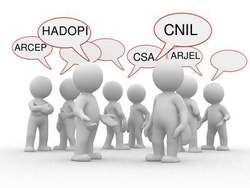Compliance and Regulation Law bilingual Dictionnary

Rating agencies are private companies that assess the risk of defaulting payment by debtors. As such, the rating of a borrower affects the value of the debt security it issued and that is to circulate in the markets. That is why the activity of credit rating agencies is critical to the security of financial instruments and the functioning of financial markets, but also to the whole global credit system. For instance, an AAA rating guarantees security to investors. Rating agencies helps building trust in financial markets and in the banking system. Henceforth, since everyone relies on them as they save people's time from seeking on their own information on securities or on those who issue them on the marks, international rating agencies have become crucial operators.
'Rating' has also become a business, which is now concentrated within the hands of three undertakings (two American and one French). It has often been said that these three are conflicted. Some have indeed brought up the fact as they have provided the markets with unreliable information (especially about subprime and securitization) prevented them to self-discipline, which eventually participated in the global spread of risks and defaults.
The difficult history between the rating agencies, whether they are considered as mere businesses, crucial operators or as companies undertaking a public service, which eventually led to implement a specific Regulation in the immediate aftermath of the financial crisis, shows how the information is a public common. This justifies the intervention of the Financial Regulator, namely to better protect the consumer. Should we go further on? Some have mentioned the idea of nationalizing the business and hand it over to Government institutions (or at least public ones). This is, however, no longer on the agenda, as many conflicts of interests may arise since rating agencies keep on rating the paradoxical debtors that States are.

"Regulation Law" (with a capital on "Regulation" in order to distingu with regulations wihch are simply texts) or "Regulatory Law" is defined as the balance between the principle of competition and another principle, a-competitive, even anticompetitive.
It is thus connected with a liberal theory since the principle of competition is always there. However, it does not depend on the complete and sufficient organization of a market, a sector or a channel. This may be due to technical or economic data that make the market itself unworkable: there are market failures. For example, transport networks constitute economically natural monopolies which make network industries, such as telecommunications, railways or energy, need to be replaced by monopolies, ie powers which no competition will counterbalance and which, except to nationalize, so to leave the liberal perspective, independent regulators will monitor. Thus, regulation always has a political background, since it is a choice of general framework of liberal economy, reacting to market failures in a different way than by the administered economy which operates through state intervention.
The heart of the Regulation is therefore the Regulator. In many countries, it often takes the institutional form of independent administrative authorities (IAA), which coordinate operators, whether public or private. But politics is still present in another and very strong way alongside Law and Economy, for the principle weighed against the principle of competition may not be another economic principle as the above-mentioned example of the natural monopoly or the systemic risk of money and financial markets, but a purely political principle.
For example, it is necessary to assert, because the People have decided it and accept to pay its collective price through taxes, that everyone is entitled to a certain level of social protection, to access to health, to education, to a healthy environment, to information, etc., with the fair price being able to go as far as being free of charge, without any relation to the fair market price. Each person has to accede to this good because in this he accedes to his very humanity - notion of commons goods or universal good or "good of humanity". This notion is both relative and political but marks a civilization.
Whether it is a matter of building a market, of maintaining heterogeneous equilibriums or of maintaining marks of civilization in them, Regulation is always an artefact which presupposes the deployment of a great power ( wich was expressed by the State, but today it is that of the regulators). In this respect, it is the goal of efficiency which is above all the aim sought, for example an effective access to the transport network ora successful management of crisis and risk.
All the Regulation Law is deduced from the purpose served, is only an instrument at the service of the finality. That is why its legal reasoning is teleological, that is to say, constructed from ends. This instrumentalisation of Law can be expressed trivially: "the end justifying the means". It has legitimized ample legal powers, including sanctions, cumulated by regulators, against which the classical jurists have protested, to which the Constitutional Courts have set limits. But it is in the nature of regulatory techniques to be teleological.
Regulation then engenders a confrontation between Law and Economy, of which Politics holds the scourge.
Thus, for example, while technical market failures impose, can - or maybe must - be resolved internationally, and do not require political consensus, the political dimension of the Regulation Law (notably the "rights of access to ... .. ") must on the contrary meet the adhesion of peoples and / or nations. This is why Regulation, which is too often enclosed in economic theory alone, has not only a very strong legal translation, but also major political implications. Indeed, by putting the Regulator at heart and the decisions it adopts, Regulation leads to the increasing power of the judges who control these decisions, whereas the legislative acts are unharmed. For example, the continental countries saw the power of judges to increase, bringing them closer to Common Law countries, ni so many crucial sectors, such as network industries, banking and finance. In addition, Regulators are necessarily autonomous of sector but also of government, creating a game of political equilibrium where each is both independent but accountable to each other : a check and balance mechanism, fundamental to the United States but hitherto unknown in many continental countries, such as France.
Thus, if one speaks so much of the Regulation, it is on the one hand because it concerns activities which, even if they are locked up in specific sectors such as telecommunications, energy, banking or Finance, are all indispensable underpinners to the prosperity and sustainability of the general economy: there is no proper functioning of ordinary markets and a satisfactory European construction if there is no sectorial regulations.. But it is also because the Regulation Law has upset the organization of political powers in many countries, bringing them to a model close to that which organizes the relations of political powers in the United States..
Regulator (Regulatory Authority)

The Regulator, which generally takes the form of an independent administrative authority (IAA), is the person or body that monitors and controls the sector in order to maintain a balance between the principle of competition and another principle. For example, the telecommunications regulator will ensure the licensing of mobile telephony; or the energy regulator will monitor the access conditions of competitors to the electricity transmission grid ; or the financial regulator will monitor the reliability of the financial information it will make available to investors.
The regulator must either build competition to achieve the liberalization of a sector or preserve it of the systemic risks that threaten it. For this it must have very large powers both in ex ante and ex post. Thus, in most cases, it has an ex ante regulatory power, for example through a general power to adopt texts, such has the French Financial Markets Authority (Autorité des Marchés Financiers - AMF). Ex post, it has also an administrative power to sanction and settle the disputes.
The diversity of objectives, their heterogeneity, and even their contradiction, makes it difficult to satisfy everyone, but also - and it is another issue - offers the regulatory authority a large margin of discretion since it can easily justify its use of his powers by aiming one objective or another. The theoretical and practical question of the "discretion of the regulator" is a major political problem, especially for those who claim that the regulator would only be an expert and not exercise political power, that is to say do not make discretionary choices for the social group. All these powers are nonetheless exercised in compliance with fundamental procedural safeguards, since the persons concerned may challenge the acts before the courts.
Finally, according to Hannah Arendt's model, beyond the law, the Regulator must first of all have "authority" (gravitas), that is, sufficiently impress and the sector and the government to be respected, and its prescriptions taken in consideration. For this, the regulatory body must have the information, belong itself to the same private circles of its interlocutors and widely communicate with its foreign counterparts. In this, the Regulator sometimes appears as a sort of minister, who would hold its power of the sector itself, but must always remain neutral. The issue of its independence and its absence of capture is all the more crucial.

First of all the responsibility of the Regulator. Because the Regulator, although independent of the government, belongs to the State, when it commits a fault in the exercise of its functions, it is the responsibility of the State which is engaged. According to the principles of public law in this area, the demonstration of gross negligence is required. Some saw a contradiction between the fact that the government could not give any order to the regulator and that nevertheless the State and the public finances had to answer for its actions. For this reason, more recent laws have conferred legal personality on the new regulator, for example in France the Autorité des Marchés Financiers - AMF (Frech Financial Markets Authority), which makes it possible for the Regulator to own a proprietary asset that enables him to answer for his own faults To third parties. Moreover, according to a problem similar to that developed in relation to judges, the regulator is independent, and as such must remain politically not accountable for the use he makes of his powers. However, he must be held accountable.
Accountability, which is difficult to implement, is expressed for all regulators through an annual public report to the Head of State, the government and Parliament. The existence of recourse against its decisions before the judges is a kind of accountability. Finally, some regulators believe that the collegiality of their functioning and that the motivation of their decision is an essential way for them to be accountable.
Then, the responsibility of the operators. At first it tends to be "objective". In a system based on the aims and effectiveness of the realization of these, operators will be "responsible" without even intending to do wrong (subjective definition of fault, imputation of damage , f liability), because there was a "breach", because the operator was "in a position" to prevent a situation which was contrary to the aim pursued by the regulatory system, or was in position to ensure that a situation crystallizing a goal pursued by the regulatory system materializes and that this has not happened.
This responsibility creates sanctions. What is more, it migrates from the ex-post to the ex-ante, for moving towards a more common sense of what a "responsibility" is: a power to better fulfill a duty, The operator must use his force in an effective way so that the goals of the regulation system become concrete thanks to him, in alliance with the action of regulation: it is the concept and mechanism of compliance.

The procedural guarantees enjoyed by a person whose situation may be affected by a forthcoming judgment are mainly the right of action, the rights of defense and the benefit of the adversarial principle.
The rights of the defense have constitutional value and constitute human rights, benefiting everyone, including legal persons. The mission of positive Law is to give effect to them in good time, that is to say from the moment of the investigation or custody, which is manifested for example by the right to the assistance of a lawyer or the right to remain silent or the right to lie. Thus the rights of the defense are not intended to help the manifestation of the truth, do not help the judge or the effectiveness of repression - which is what the principle of adversarial law does - they are pure rights, subjective for the benefit of people, including even especially people who may be perfectly guilty, and seriously guilty.
The rights of the defense are therefore an anthology of prerogatives which are offered to the person implicated or likely to be or likely to be affected. It does not matter if it possibly affects the efficiency. These are human rights. This is why their most natural holder is the person prosecuted in criminal proceedings or facing a system of repression. This is why the triggering of the power of a tribunal or a judge offers them in a consubstantial way to the one who is by this sole fact - and legitimately - threatened by this legitimate violence (one of the definitions of the State ).
The rights of the defense therefore begin even before the trial because the "useful time" begins from the investigation phase, from the searches, even from the controls, and continues on the occasion of appeals against the decision adversely affecting the decision. The legal action being a means of being a party, that is to say of making arguments in its favor, and therefore of defending its case, shows that the plaintiff in the proceedings also holds legal defense rights since he is not only plaintiff in the proceedings but he also plaintiff and defendant to the allegations which are exchanged during the procedure: he alleged to the allegation of his opponent is not correct.
They take many forms and do not need to be expressly provided for in texts, since they are principled and constitutionally benefit from a broad interpretation (ad favorem interpretation). This is the right to be a party (for example the right of intervention, the right of action - which some distinguish from the rights of the defense - the right to be questioned, such as the right to be brought into question (or examination), right to be assisted by a lawyer, right to remain silent, right not to incriminate oneself, right of access to the file, right to intervene in the debate (the rights of the defense thus crossing the adversarial principle), right to appeal, etc.
It is essential to qualify an organ as a tribunal because this triggers for the benefit of the person concerned the procedural guarantees, including the rights of the defense, which on the basis of Article 6 of the European Convention on Human Rights man was made about the Regulators yet formally organized in Independent Administrative Authorities (AAI). This contributed to the general movement of jurisdictionalization of Regulation.

Watch the video explaining the "right to be forgotten".
The "right to be forgotten" is a recent and specifically European invention. It was designed by the Court of Justice of the European Union in the Google Spain judgment of May 13, 2014, so that in this world without time, in which all information is eternally stored and available that is the digital world, the individual thus exposed can be protected against this new phenomenon, since forgetting no longer exists, by Law which by its power endows it with a "right to be forgotten". In this the term Right to be forgotten is more accurate.
Because Law is made to protect human beings, the technological efficiency which created the digital world is limited by the new legal prerogative of the person to make unattainable information which concerns him when it takes on a "personal character". This was taken up by the community regulation of April 27, 2016, often called GDPR, transposed in the member states of the European Union no later than May 25, 2018.
More than in the laws which have taken up the idea of protection of persons in the handling of "data" by others, expressing more the concern to protect the consumer in a market economy, it is a question of directly protecting persons. in a technological world allowing blind obedience, Europe rejecting this model because the technique of the files left him a terrible memory because of the Second World War. However, Law is the memory of peoples and expresses the “spirit” of these (Savigny).